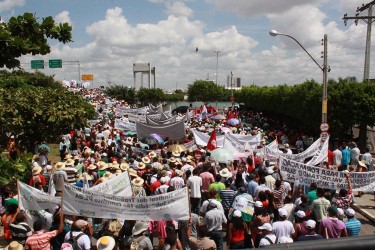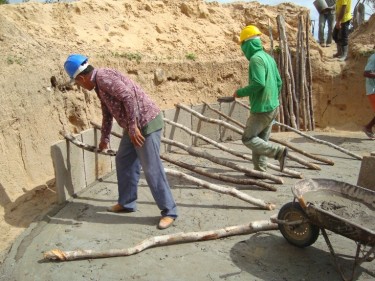On December 21, 2011, almost 10,000 residents of the arid northeast of Brazil (called the sertão) crossed the bridge that links Juazeiro, in the state of Bahia, and Petrolina, in the state of Pernambuco. Farmers were protesting in favor of an agreement between the government and the organization Articulação do Semi-Árido Brasileiro (ASA) (Brazilian Semi-Arid Network), which leads the project constructing cisterns for rainwater catchment and storage for beneficiary families, in the subregion of Brazil with the greatest problem with desertification.
The Ministry of Social Development and Combat of Hunger (MDS) had announced that the transfer of R$120 million to the program to build the cisterns would no longer happen. As an alternative, the government would offer plastic cisterns that allegedly do not match the realities of the people and that would no longer be constructed by citizens themselves, but instead “donated” by state and city governments. The agreement with ASA, which has existed for over a decade, was threatened in the end of December.
The mobilization forced the government to reverse its announced suspension. On December 23, representatives of ASA and the Ministry met and the continuation of the agreement without mediation of city and state governments was guaranteed at least until April 2012. On January 3, the ADA and Ministry will meet again.
On social networks, discussion in last days was centered on the reason for substituting the ASA for greater dependence on the decisions of local public officials. On Twitter, theologian and writer Leonardo Boff (@LeonardoBoff) commented [pt], in a series of tweets:
A ASA construiu centenas de cisternas e educou o povo a conviver com o semiarido. A Ministra vai introduzir cisternas de plastico, mexicanas. (…)
Abandona-se um projeto popular levado pelo proprio povo. Se triunfar fica claro o viés tecnocrático do Gov.Dilma sem diálogo (…)
Resolver os problemas dos pobres sem envolver os pobres é erro crasso e não funciona. Temos que denunciar e resistir e obrigar a um dialogo.
Beyond the possibility of the turning residents into dependents of a technology unknown to them, the plastic cisterns could become an electoral currency in the hands of local politicians, as writer Frei Betto pointed out on his Twitter account (@Frei_Betto).
Geographer Janete Limelo questioned [pt] the first position of the Federal Government:
A quem interessa trocar cisternas de alvenaria que custam R$2000, 00 por plástico que custam R$5000,00?? ow.ly/873r8 #perguntepradilma
The ASA, composed of 750 civil society organizations, coordinated two projects: Program for a Million Cisterns (P1MC) and Program One Earth and Two Waters (P1+2). With the Federal budget, 371,728 cisterns have already been constructed by the beneficiaries themselves, over 2 million Brazilians. The cistern program is recognized internationally as “a reference in management and social inclusion in the area of access to water and the right to food and nutritional security of families living in the semi-arid region” as the Mandacaru de Pedro II Training Center emphasized.
Turuna Tântalo on the blog Soda Cáustica (Caustic Soda) [pt], reminded that the organization “[bringing together] groups interested in turning around the position of miserable exile imposed on the peoples of the semiarid region”, began after the 3rd Conference of the Parties of the Convention Against Desertification COP3 of the UN, in the city of Recife:
No dia 26 de novembro de 1999, contrariando as expectativas do mundo piedoso com os pobres coitados sem água, gente aliada aos supostos pobres-coitados-sem-água anunciava a festiva e profética Declaração do Semiárido Brasileiro.
The documentary A Different Look, made by ASA Brazil, ” presenting a region that is not defined by cracked earth, thirst and hunger. But, that there is another side, of production, prosperity and solidarity. This is possible when farmers join organizations in an interesting coming together of ideas.”
The discourse that there is not enough water in the northeast of Brazil was important ally of the indústria da seca [literally: the drought industry, referring to elite manipulation of government subsidies], one of the more nefarious relations of power in Brazilian politics, which fed the creation of the myth of the “poor”, “helpless” and “underdeveloped” northeasterner which has permeated the national imagination.
Due to a lack of opportunities, many northeasterners hop on pick-up trucks and migrate to become day laborers in construction or maids in the southeast. The cistern is a symbol of a change in this narrative or as Turuna Tânalo writes in the blog Soda Cáustica [pt] “a change of paradigm”:
…é possível viver na caatinga, resgatando e melhorando tecnologias adequadas para o calor intenso, assim como vivem os esquimós no gelo seco do Ártico, assim como vivem os indígenas nas alturas de ar rarefeito dos Andes, assim como vivem os cosmopolitas em meio ao barulho e à multidão da Grande Cidade…..
Silenciosamente, mas obstinadamente, abandonamos o delírio televisivo de que aqui chovesse como chove no sudeste: a gente da terra árida foi despertando para o fato de que não é exatamente água que falta…
…it is possible to live in the caatinga shrublands, bringing back and bettering appropriate technology for intense heat, just as Eskimos live in the dry ice of the Arctic, as the indigenous live in the air-starved heights of the Andes, as the cosmopolitans live in the midst of the noise and crowds of the Big City…
Silently, but stubbornly, we abandon the televised delirium that here it should rain like it rains in the southeast: the people of the arid lands have been waking up to the fact that it is not exactly water that is lacking…
Developmental myopia
The debate about the partnership between ASA and the Ministry also brought to the fore the issue of the developmental policies of Dilma's government. The Vice President of the Indigenist Missionary Council (CIMI), Roberto Antonio Liebgott, points out [pt] that Brazilian economic growth is based on partnerships between the state and large corporations, without including citizens as actors in social transformation:
O ano em que Dilma Rousseff decidiu romper a parceria com a Articulação no Semiárido Brasileiro (ASA) que previa construir um milhão de cisternas e garantir água aos nordestinos. Ao invés disso, decidiu oferecer cisternas de plástico (PVC), levando lixo ao sertão brasileiro. É a política do “goela abaixo”
Global Voices collaborator Raphael Tsavkko highlighted [pt] the problem of public policies that do not include local residents as agents of transformation:
Nada contra assistencialismo em si, enquanto políticas emergenciais de curto/médio prazo, o problema é trocar um projeto que emancipa, por políticas de apoio ao retorno do coronelismo e que substituem a autonomia da população e sua independência, dando-lhes dignidade.









1 comment